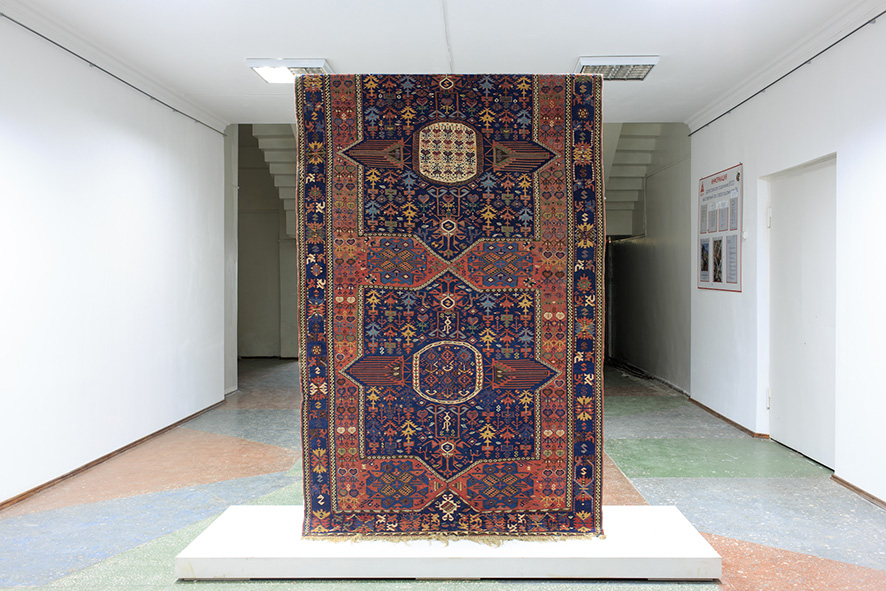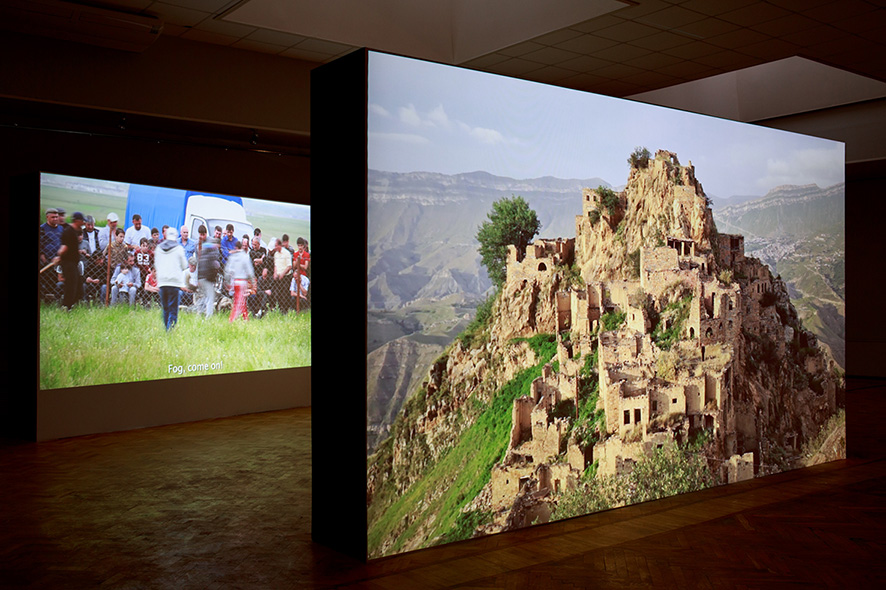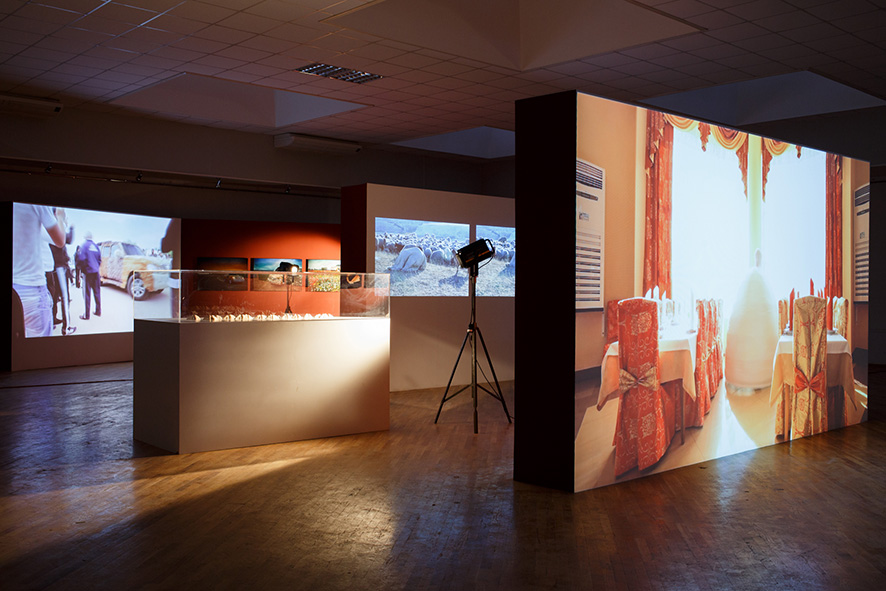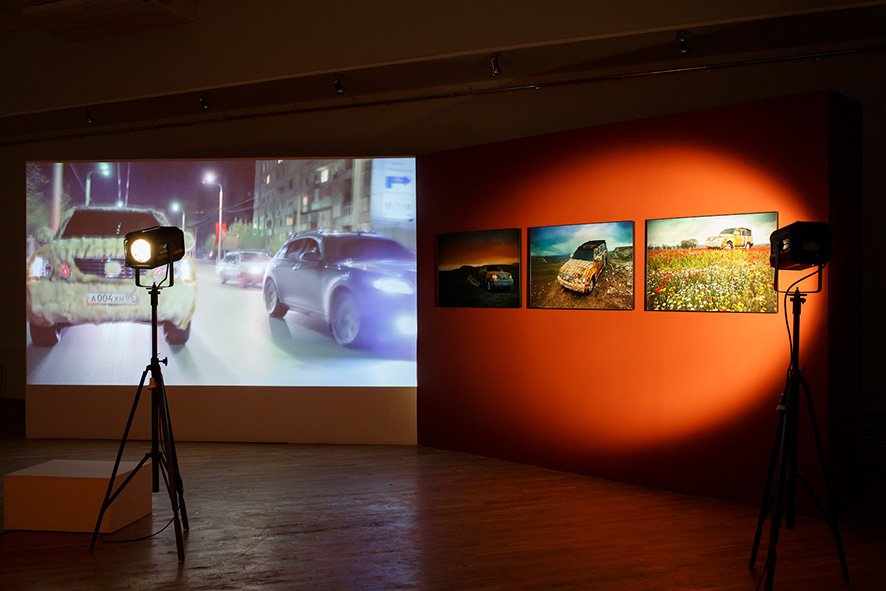Shows
Taus Makhacheva’s “Story Demands to be Continued”


There is a saying in Dagestan: To possess many carpets is like owning a library, since each is woven with a story. Thus it was fitting that Taus Makhacheva’s solo exhibition “Story Demands to be Continued,” which opened in Makhachkala, the capital city of the republic of Dagestan, Russia, last November, ushered in viewers with a carpet hung on the wall–an added touch by curator Alexey Maslyaev. Beyond this display was a short video in which Makhacheva rolls over a carpet depicting the Garden of Eden, wrapping then unwrapping herself with it, slowly. Makhacheva is an artist who, as Maslyaev's exhibition text states, “presses an ear to the earth and listens” and feels “the uneasy tremors of the changes taking place everywhere in her native Dagestan.”


The exhibition was both an interpretation of Dagestani culture and a challenge to it. Among the works were Gamsutl (2012), which focused on the ruins of the abandoned, ancient Avarian mountain settlement carved from rocks, in which a figure shrouded in black recreates iconic war poses, and Rekhen (2009), where, against a backdrop of the mountain villages of Tsada and Akhalchi, is portrayed a young man walking towards a herd of sheep before falling on his knees in the midst of his flock. Both works nod to Dagestan’s history, the latter in the man’s coat, a traditional Timug shepherd’s coat, which looks more like something one might find in a museum than in a contemporary art exhibition.
Indeed, for Makhacheva, the landscape, like a woven carpet or layered painting, is both a record of history and a site of change. In A Space of Celebration (2009), a witty video on the commodification of the marriage ritual, set in a traditional wedding hall, two bodies donning white cloth which has been folded like a decorative napkin, pop up in various places along a banquet table. Such human elements are essential to Makhacheva’s representations of physical and psychological space. Another work, Landscape (2013), featuring laser-cut wooden noses taken from Caucasian profiles and presented in a display box, evokes the mountains of the Caucuses.

Other works were less literal. In The Fast and The Furious (2011), Makhacheva decked a four-wheel-drive in old Soviet furs sourced from a Moscow flea market and drove it to the new highway linking Makhachkala to its airport with the intention of joining a drag race (though in the end, the artist did not participate due to a police raid). Presented in both video and photographs, the work investigates a male-dominated subculture.
Similarly, Let Me Be Part of the Narrative (2012), a three-screen video installation, focuses on the testosterone-fueled Dagestan Dog Fighting Championship. On two screens, interviews with dog trainers, including the only woman to take part, are interpolated with scenes of dogs wrestling. This video was juxtaposed with a Soviet documentary on five-time world champion, Dagestani wrestler Ali Aliev. The resulting spectrum of works explores the atavism of competition, from a local to global scale.
As the exhibiton’s title suggests, the works in the show are meant to illustrate a story. Let Me Be Part of the Narrative, for example, reflects both micro and macro histories of the vast mountainous region. In Way of An Object (2013), three objects-turned-puppets—a Kubachi marriage bracelet, a carved wooden saltbox and a painting by Russia’s Viktor Vasnetsov of a prophet bird—also debate their place within the country's history. Makhacheva is drawn to these objects because of their loss of function and inability to speak. Thus, for this exhibition, she animated them, just as her own works illuminated the complex landscape of Dagestan and the stories defining it.
“Story Demands to be Continued” was on view at Republic of Dagestan Union of Artists, Makhachkala, from October 5–November 20, 2013.
Stephanie Bailey is the managing editor of Ibraaz, a consulting editor for Naked Punch and an editorial correspondent for Ocula.







